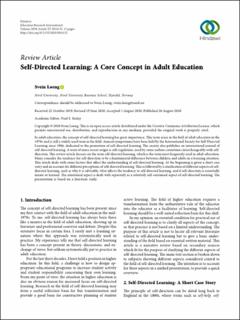Self-directed learning : A core concept in adult education
Peer reviewed, Journal article
Published version

Åpne
Permanent lenke
https://hdl.handle.net/11250/2728192Utgivelsesdato
2020Metadata
Vis full innførselSamlinger
Originalversjon
Loeng, S. (2020). Self-directed learning: A core concept in adult education. Education Research International, 2020: 3816132. doi: 10.1155/2020/3816132Sammendrag
In adult education, the concept of self-directed learning has great importance. This term arose in the field of adult education in the 1970s and is still a widely used term in the field. Annual symposiums have been held by the International Society for Self-Directed Learning since 1986, dedicated to the promotion of self-directed learning. The society also publishes an international journal of self-directed learning. A term of more recent origin is self-regulation, used by some authors sometimes interchangeably with self-direction. This review article focuses on the term self-directed learning, which is the term most frequently used in adult education. Many consider the tendency for self-direction to be a fundamental difference between children and adults in a learning situation. This article deals with some factors that affect the understanding of self-directed learning. At the beginning is given a short case story and an account for different perceptions of self-directed learning. This is followed by a clarification of different aspects of self-directed learning, such as why it is advisable, what affects the tendency to self-directed learning, and if self-direction is essentially innate or learned. The situational aspect is dealt with separately as a relatively self-contained aspect of self-directed learning. The presentation is based on a literature study.
